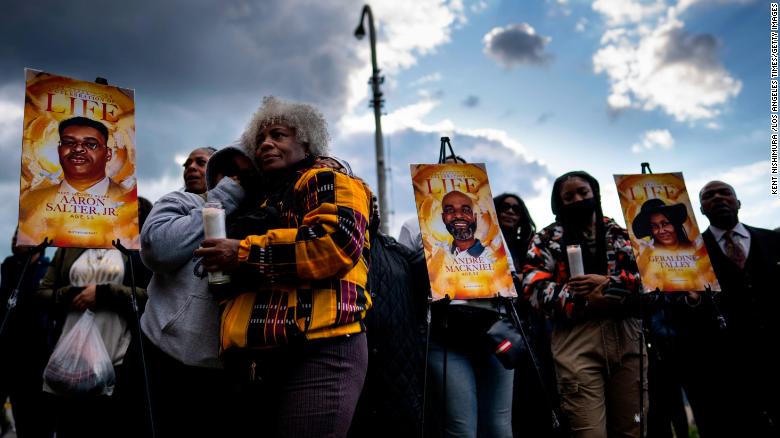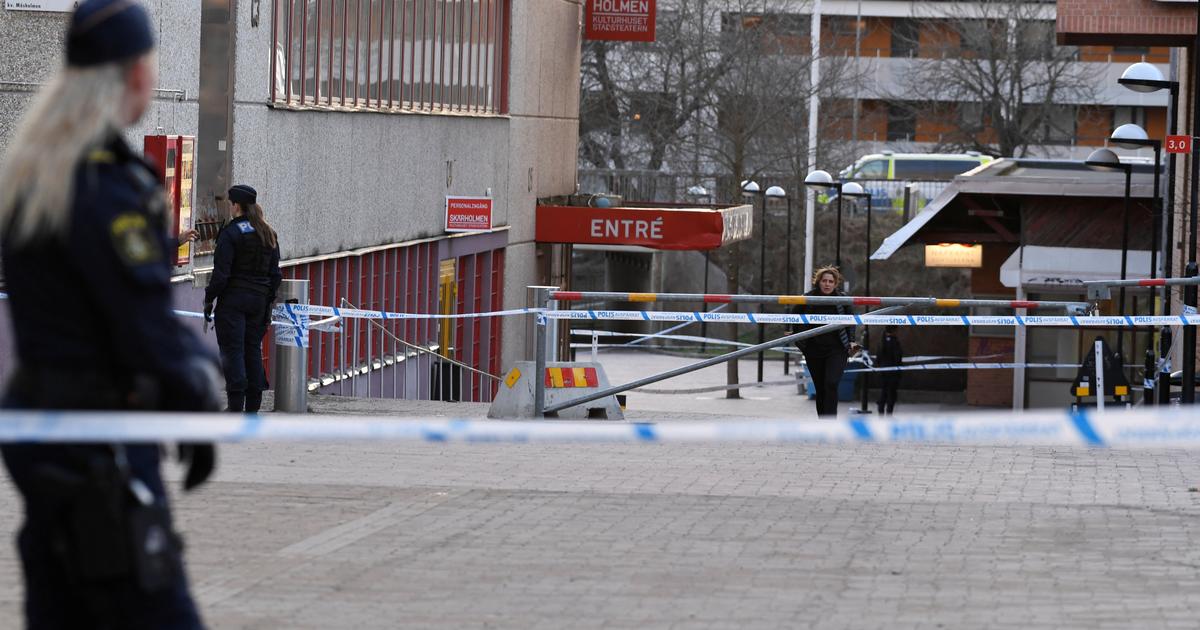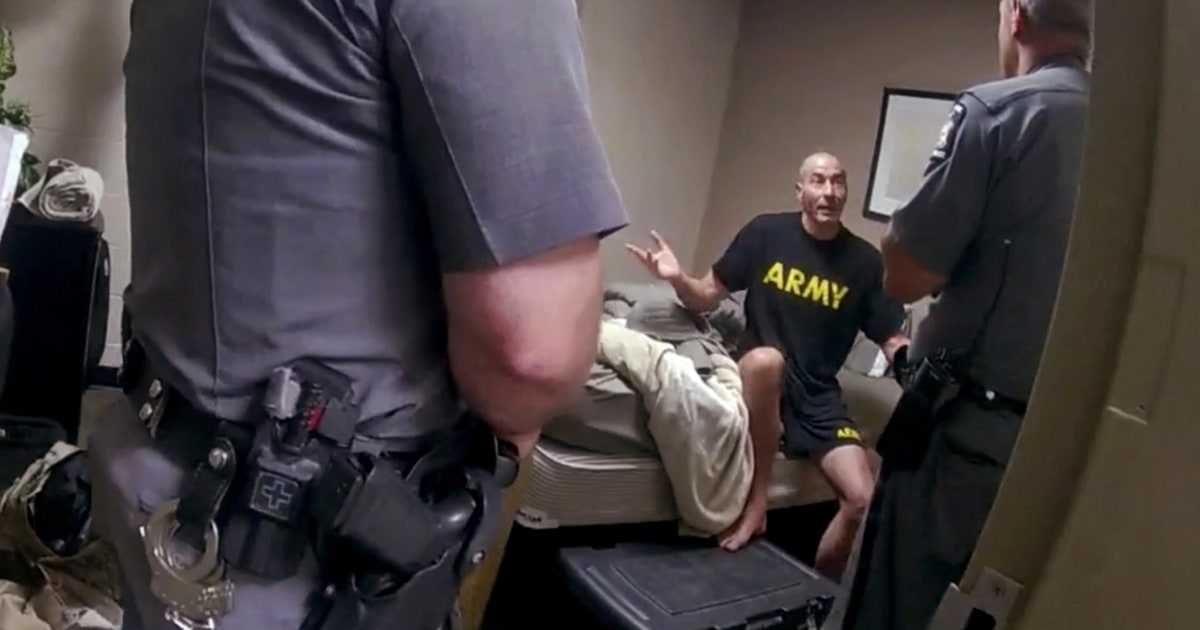Doctor who confronted the shooter in Laguna Woods is considered a hero by the authorities 0:53
(CNN) --
In recent years, perpetrators of mass shootings have increasingly targeted a number of places with minimal security, including churches, synagogues, grocery stores and movie theaters.
Experts who study violence and mass shootings say this is not a surprise.
These attackers, including the one last weekend in Buffalo, choose so-called "easy targets" where people are largely unprotected and where their bullets will have the most impact.
Before 2017, there had only been one recorded mass shooting in a supermarket in the United States, according to Jillian Peterson, a criminologist at Hamline University in Minnesota and founder of The Violence Project, a nonpartisan think tank.
That was in 1999, when an assailant dressed in camouflage killed four people in a Las Vegas supermarket.
But for the past three years, attackers have targeted a kosher market in Jersey City, New Jersey;
a Walmart in El Paso, Texas;
a supermarket in Boulder, Colorado; and now a supermarket in Buffalo, where an 18-year-old white man is suspected of fatally shooting 10 shoppers, most of them black.
These attacks come on top of other recent mass shootings at places of worship, including a black church in Charleston, South Carolina;
a synagogue in Pittsburgh and a Baptist church in Sutherland Springs, Texas.
advertising
Mass shootings increased in the United States during the pandemic, according to a study
As law enforcement grapples with this violent radicalization, experts say trying to secure thousands of these easy targets across the country would be nearly impossible.
Javed Ali, a former senior FBI and Department of Homeland Security official, describes it as "exponentially more complicated" than efforts to protect critical infrastructure after the September 11, 2001, attacks.
"From what we know of perpetrators of mass shootings, they tend to pick targets that allow them the best chance of success. The combination of the target's vulnerability plus ability to strike, plus perceived impact often determines how these events unfold." , although there is no clear scientific or mathematical algorithm that can accurately determine when and how attacks occur," says Ali, an associate professor at the University of Michigan.
"So trying to 'harden' numerous soft targets across the country would be a complex task."
A memorial honors the victims in the parking lot of a Walmart in El Paso, Texas, after an August 2019 shooting there.
Tung Yin, an expert on national security and terrorism, uses a balloon analogy.
"Trying to stop those attacks by hardening a set of targets is like squeezing one of those balloon animals: the air just goes to a different part of the balloon," says Yin, a professor at Lewis & Clark School of Law in Portland, Oregon. .
Would-be terrorists will simply look for an easier target, he says.
There are no easy solutions.
But experts say a better approach would be to try to identify potential online attackers before it's too late.
Copycats drive some of the attacks
Mass shootings tend to breed copycats, fueled by the media coverage and notoriety these shooters gain, Peterson says.
(CNN and the Gun Violence Archive define a mass shooting as one in which four or more people are injured or killed.)
Peterson describes it as a social contagion.
"Once a shooting gets a lot of media attention, it becomes a role model for future shooters," says Peterson.
"Individuals who are on edge and looking for answers see themselves in other authors, and are looking for the same fame and attention."
Residents hold a vigil across the street from Tops Friendly Market in Buffalo, New York, the site of a deadly shooting last weekend that left 10 dead.
In the aftermath of the Buffalo massacre, authorities found evidence indicating the alleged shooter had studied previous hate attacks, an official familiar with the investigation said.
In a hate-filled document, the Buffalo suspect named the perpetrator of a 2019 mass shooting that killed dozens of people at a mosque in Christchurch, New Zealand.
The fact that these attackers operate alone also makes it harder to stop them preemptively, experts say.
"We are not dealing with organized threats. Lone attackers can move around undetected and without breaking laws until the very day," Ali says.
"How broadly do you want to impose security measures? They would have to be very broad and generalized."
Some mass shooters target a specific type of person
Many recent aggressors appear to have been motivated by hatred of blacks, Hispanics, or Jews.
Grocery stores in certain neighborhoods are frequented by a specific demographic, which can make them a target for hate-fueled violence, says Peterson, who has written a book called "The Violence Project: How to Stop a Mass Shooting Epidemic ".
Some examples are Asian stores and kosher supermarkets, she says.
The suspected gunman in the Buffalo shooting told authorities he was targeting black people, according to an official familiar with the investigation.
Police gather at the scene of a shooting at a Jewish deli on December 11, 2019, in Jersey City, New Jersey.
Investigators believe the suspected shooter was in Buffalo a day before the shooting to reconnoiter at the market, Buffalo Police Commissioner Joseph Gramaglia told CNN.
During his visit, he noted the number of black and white people in the store.
Other recent shootings appear to have been inspired by similar hatred.
Investigators say a deadly 2019 attack on a kosher market in Jersey City, New Jersey, was fueled by anti-Semitism.
How to process anxiety and fear after mass shootings, according to experts
"We believe the suspects held views that reflected hatred of the Jewish people as well as hatred of law enforcement," New Jersey Attorney General Gurbir S. Grewal said at the time.
In 2018, a white supremacist shot and killed 11 Jews at a Pittsburgh synagogue.
While receiving medical attention after the shooting, he told a SWAT officer that he wanted all Jews to die, according to a criminal complaint.
Eleven people were killed in an October 2018 shooting at Tree of Life Congregation in Pittsburgh.
The man accused of killing 23 people at a Walmart in El Paso, Texas in 2019 told police he was targeting Mexicans, according to an arrest affidavit.
Investigators contend that he wrote a document in which he described his hatred of immigrants and Latinos, and said he wanted to stop the "Hispanic invasion" of Texas.
The Center for Strategic and International Studies said white supremacists and other far-right radicals were responsible for 66% of domestic terror attacks and plots in 2020.
And in a 2020 document, Homeland Security officials said "racially and ethnically motivated violent extremists, specifically white supremacists, will remain the most persistent and deadliest threat" in the country.
Experts say trying to protect stores from attacks is impractical
It is normal after shootings to take extra security measures and ask for security to be tightened, says Yin.
But he says it's important to evaluate those decisions from an economist's perspective.
"For each possible security measure, what is the marginal benefit and what is the marginal cost?"
Adding checkpoints and metal detectors to enforce a gun-free zone could lead to long security lines, creating a new point of vulnerability for attacks, he says.
These measures could also turn a routine trip to the store into a nuisance.
"It would add so much time that, at some point, it would strangle the livelihood of society," he says.
Having more armed security guards isn't necessarily effective either, experts say.
In Buffalo, security guard Aaron Salter fired his gun at the assailant, who was wearing a bulletproof vest.
The assailant was uninjured and returned fire, killing Salter.
"Often our reaction after these horrific tragedies is to add more armed security, which influences our fear, anxiety and sense of safety in the world at large," says Peterson.
"We've done previous research showing that armed officers often don't downplay casualties...because assailants are often suicidal and planning to die on the spot. That makes these tragedies harder to prevent."
There are suggestions to minimize the threats
Pete Eliadis, a former law enforcement official and founder of a security consulting firm, says most people in the United States don't tolerate tight security in places like stores.
However, he believes that companies can help reduce risks by making safety training a higher priority.
"Active threats are no longer a rarity, but something organizations should train their employees for," he says.
"Organizations train their employees for a variety of things: sexual harassment, cybersecurity... but the one thing they can really die from, they don't prioritize."
People outside the scene of Saturday's shooting at the Tops supermarket in Buffalo.
Peterson stresses the importance of keeping firearms out of the hands of dangerous people through "red flag" laws and universal background checks.
Ali says another approach would be to identify extremist threats online before they lead to violence.
Constitutional protections make it difficult for law enforcement to act on hate speech, but private companies can, he says.
Social media platforms pledged to curb extremism.
The Buffalo massacre puts them to the test
“Policing government hate speech online is a dead end, given First Amendment protections on free speech,” he says, “so the tech companies that own and operate the platforms on which where this content resides are in a better position to detect, flag and remove than the government."
"We need solutions that are more efficient than trying to overprotect vast places," says Ali.
"I would like us to go further, identify who these people are and ... do a better job of detecting these people. If we wait until the last minute, we can't do much."
mass shootings









